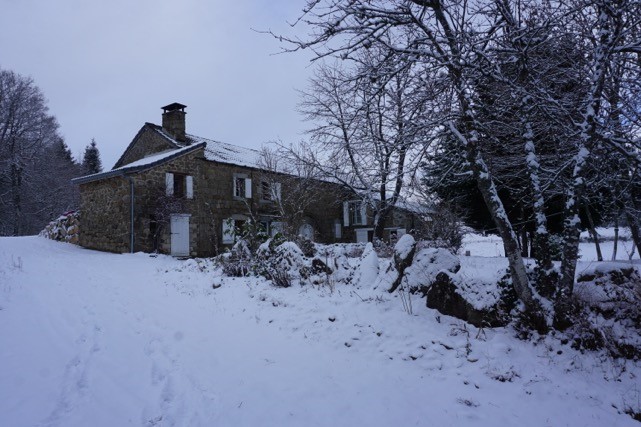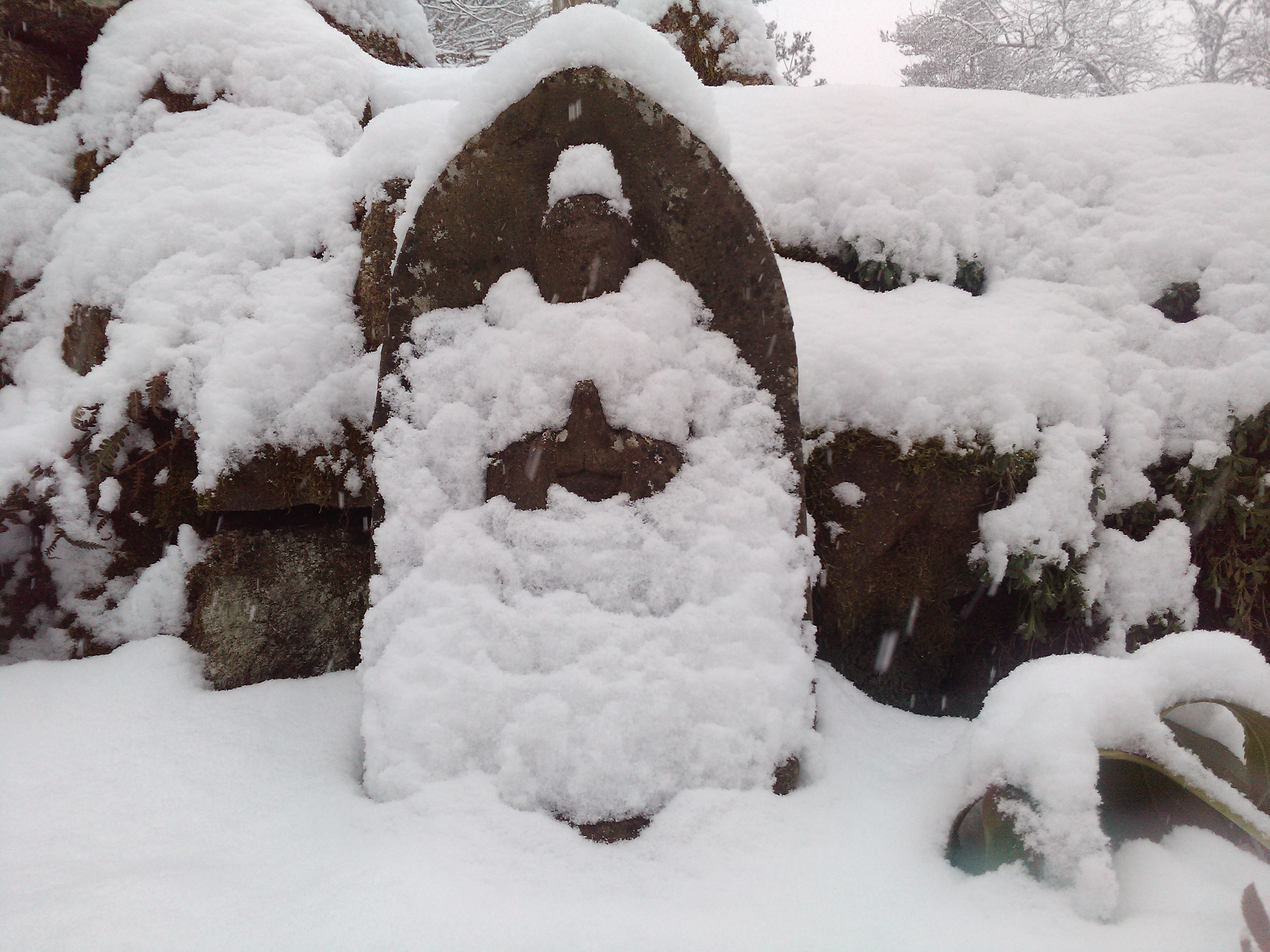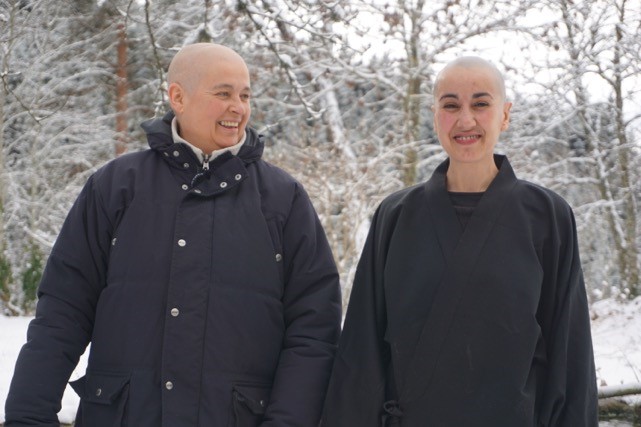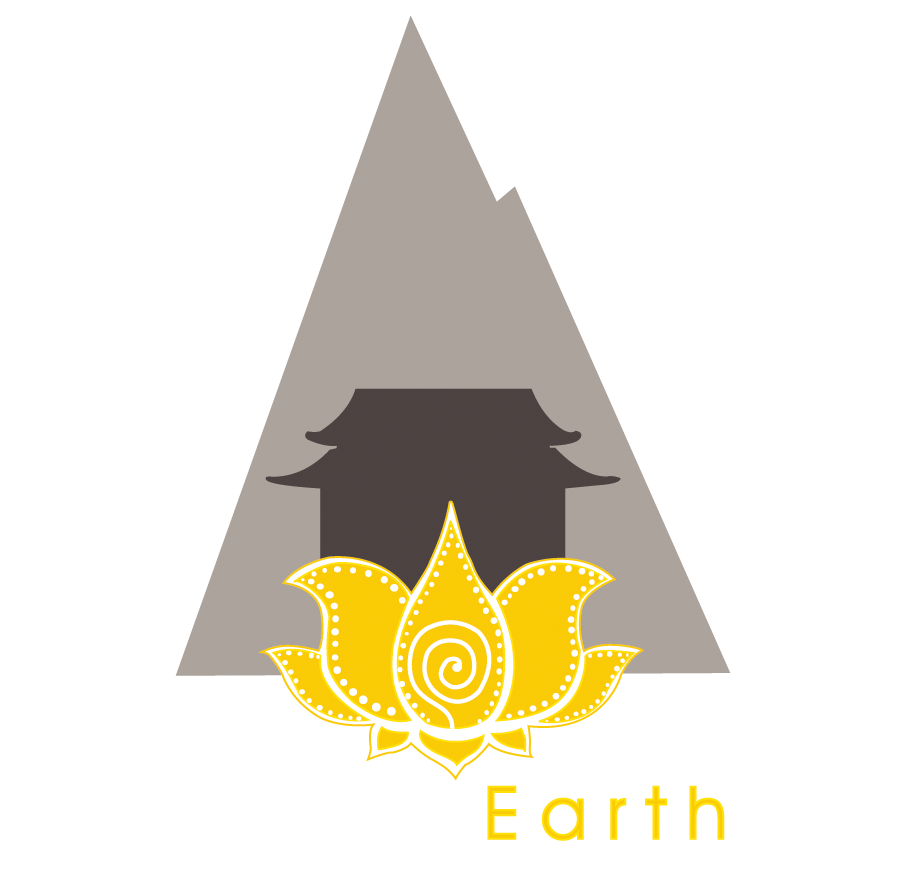“And I am the woman
who goes to the foot of a tree
and says to herself:
‘Ah, what joy!’
and meditates with joy…”
Therigata

Bowing down
The grasses lie invisible
In the field under snow
The white heron hides
In its own appearance
La Demeure Sans Limites. Zen Soto buddhist site in Saint Agrève, Ardèche, France
January 2019. The place is resting. The body is resting. Nature is resting. This is the time for Jôkei Sensei and her assistant, Toen-Ni, to inhale during the three months of the buddhist centre’s closure before the doors open again in Spring.
It is early morning and Jizô, the Bodhisattva of the place, is dressed in white and in the silence of the snow-filled morning, he radiates a sense of joy that makes the Sensei smile.
La Demeure Sans Limites is a small, 1 hectare site. It was established 25 years ago by buddhist nun, Joshin Luce Bachoux, and is made up of field and forest, water source and garden. It even houses a small protestant cemetery (cared for by the nuns) and a way to St Jacques de Compostelle runs through it. The house is a typical farmhouse and like Ardèche has been historically, it is a place of refuge for those in need. But La Demeure Sans Limites is far from being typical…

Jizô, dressed in white
“I am still working with the name ‘La Demeure Sans Limites’ after more than 20 years here » says Jôkei Sensei. « Last Saturday, Joshin Sensei, the centre’s founder gave teachings in Paris and she talked of the relationship between ‘sans limites’ (no limits) and ‘la vacuité’ (emptiness, voidness). ‘La vacuité’ means that without the other, I am nothing. This morning we had our breakfast and really nothing we ate was produced by ‘me’. In order to eat I rely on others. So, this ‘no limits’ is very close to the notion of emptiness and as such I am nothing without others. We are truly interdependent, and so we come back to nature. If there is an action, there will be a consequence.”
This place of no limites welcomes around 120 visitors and disciples every year, who come to practice with the nuns in residence. And practice here is not only in the temple and on the zafus (meditation cushions), but also in the kitchen, in the vegetable garden, as we eat, as we walk, as we wash the dishes – every moment is practice.
Living each instant with full attention and being fully conscious of the interdependence of all things, we necessarily feel responsible for our actions towards all that surrounds us.
“For us buddhists, humans are part of nature. We are part of a whole and therefore we have such a great responsibility for nature. ‘Man’ is at the top of the pyramid – we have the power to destroy, or to take care.”
Here we have decided to take care. Take care first of our body and mind, which then dictates how we act on the outside, towards others and towards nature.
« In our practice, these are simple ethics. I must take care of what is around me, but also of myself. The Buddha is clear when he says that we must take care of ourselves before we can take care of others. That means we must be conscious, present, and straight – attentive to everything. »
The lessons appear simple, but…
“The wheel of life – is us. At the centre of the wheel there is ignorance with its two corollaries, greed and anger – that’s what makes us turn – greed. We don’t take care of anything. Only ourselves, nothing else. We always want more. We would like infinity in a finite world. It’s impossible.”
What should be done? How can we change these human tendencies?
“We need to live with the seasons. Now it’s winter, and winter is related to our kidneys. Nature is resting and we are too. We should really take our vacation in winter because it’s the time when we should take rest. We are inhaling now, because we exhale a lot the rest of the year.”
Here we also eat according to the seasons. And while eating we are fully conscious of the interdependence of all things.
“We have our garden and the people who come work there with love. When we harvest, we do it with joy and take the produce to the kitchen. So there is continuity. Toen-Ni, in the same way, receives the food – she cooks with love, compassion and care. Then we eat in silence, present and attentive. What we eat is Toen-Ni (her work and her state of mind), we eat those who have planted, harvested, we eat the sun, the earth… We are fed by all that.”
After a stay at the Demeure Sans Limites, we eat differently, think differently, pay much more attention.
“The Buddha walked, with attention. We can learn a lot from that. He was present. Here we practice walking meditation. I am completely open when I walk. I am present and I let things come. However we can’t try to grasp anything. We are like water, like the air. Then we are really in nature.”
Zen buddhism is a ‘school of the body’. We practice, all the time. And there is great joy in the simplicity.
“The name of the temple is Hôkai-ji. Ji is temple, Hô is open and Kai is the ten directions. It’s the temple open to the ten directions, so, No Limits.”
Even after a short retreat with Jôkei Sensi and Toen-Ni at the Demeure Sans Limites, we are deeply touched and we take the simple life lessons home to our every day existence – it is, after all, our responsibility. Yes there are limits to many things here, but it is precisely in these limitations that we find freedom, connection and the sense of No Limits.

Jôkei Sensi (Jô: purity, transparent, clean; Kei: grace, blessings) and Toen-Ni (Tô: lamp, light; En: Dharma)
With gratitude to Jôkei Sensei and Toen-Ni for the love and generosity they offered us during our stay in the snow at the Demeure Sans Limites.
